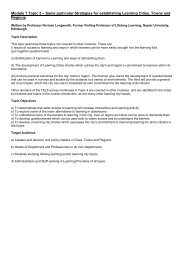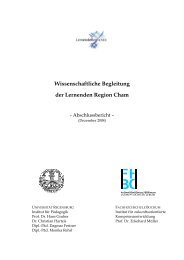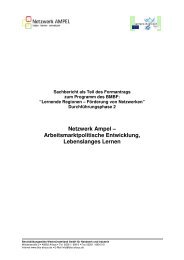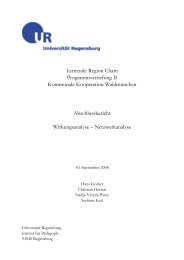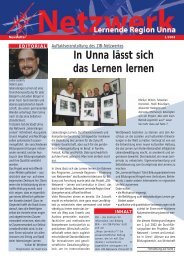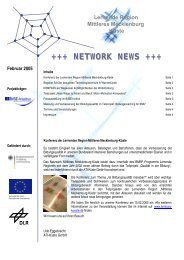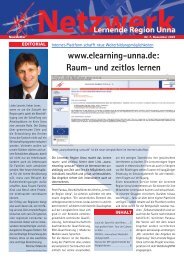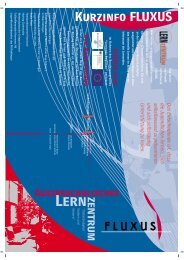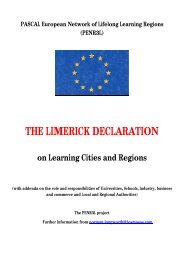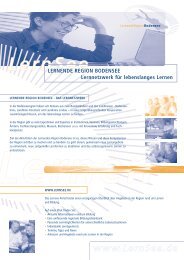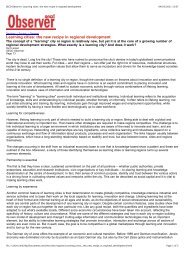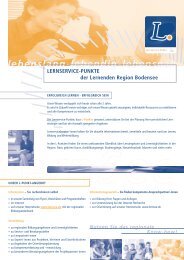SWOT-analysis as a basis for regional strategies - EUROlocal
SWOT-analysis as a basis for regional strategies - EUROlocal
SWOT-analysis as a basis for regional strategies - EUROlocal
Create successful ePaper yourself
Turn your PDF publications into a flip-book with our unique Google optimized e-Paper software.
• overall developments, dealt with in the single general <strong>as</strong>sessment, provide a<br />
common ground <strong>for</strong> all stakeholders to process their points of view.<br />
On the other hand a system of partitioned <strong>analysis</strong> with closely targeted focal are<strong>as</strong><br />
can be very efficient in practice. To function optimally it, however, presupposes that<br />
the linkages between the partial analyses are maintained. Positions of interlinked key<br />
parameters affecting all the partial analyses should be established prior to any<br />
subsequent steps in the analyses are being taken. If those in charge of one or another<br />
of the partial analyses want to change these positions, this must be:<br />
• duly agreed upon with those in charge of the other analyses, and<br />
• updated to keep the entire system consistent.<br />
It is obvious that a system with several partial analyses requires a great deal of<br />
communication and adjusting. Thus it can be argued that the use of partial analyses<br />
serves best <strong>as</strong> a recommendable solution in programming processes which are already<br />
– by the nature of the subject of the programming – focused and built on a firmly<br />
shared a priori vision with strong principal positions subsumed from it. Such a state<br />
of mind h<strong>as</strong> been frequently called strategic consciousness, preceding the actual<br />
process of making the strategy in a programme <strong>for</strong>mat.<br />
Another requirement – which actually is the other side of the previous argument – is<br />
that all stakeholders involved in the process should be able to feel that they can truly<br />
commit themselves and their respective organisations to the key parameters and the<br />
duly derived positions. Here the strategic consciousness referred to above is of key<br />
importance, creating an affirmative atmosphere helping the various stakeholders to<br />
close ranks in the face of a shared t<strong>as</strong>k.<br />
The third requirement, partly derivable from the previous arguments, favours the use<br />
of partial analyses in programming processes with only a handful of key actors with<br />
vested interests involved in designing of all the paralleling partial analyses. This<br />
argument holds true <strong>for</strong> the actor set-up of b<strong>as</strong>ically all co-operation processes.<br />
The paradox of the entire line of argumentation lies in its b<strong>as</strong>ic re<strong>as</strong>oning about best<br />
use of several partial analyses instead of a single generic one. B<strong>as</strong>ed on the arguments<br />
above it indeed appears <strong>as</strong> if such a method should be institutionally most fe<strong>as</strong>ible in<br />
highly focused processes and very limited actor set-ups. But if the scope of the<br />
programming process is relatively one-dimensional and if only a limited group of<br />
actors is involved, why break the <strong>analysis</strong> to its smaller elements and why have the<br />
strategy makers dissipate their energies into the writing of several paralleling<br />
analyses? At first sight such characteristics should point at a setting favouring the<br />
handling of the entire package of analyses <strong>as</strong> one single entity, which would mean<br />
that the logical outcome of the re<strong>as</strong>oning would lead to favouring one generic <strong>SWOT</strong><br />
<strong>analysis</strong> instead of several thematic ones.<br />
Furthermore, a <strong>regional</strong> program <strong>SWOT</strong> is to take into account the territorial structure<br />
of the target area. In general <strong>SWOT</strong> should concentrate on issues that are common to<br />
the whole region, but in large and diversified regions it may be necessary to look also<br />
at sub-<strong>regional</strong> characteristics.<br />
37



